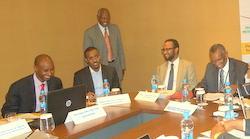 Djibouti, 26-11-2015: Officials of the African Development Bank and Ministers of the Federal Republic of Somalia in collaboration with the Intergovernmental Authority on Development (IGAD) have today November 26, 2015 launched the Somalia component of Phase II of the Drought Resilience and Sustainable Livelihood Program.
Djibouti, 26-11-2015: Officials of the African Development Bank and Ministers of the Federal Republic of Somalia in collaboration with the Intergovernmental Authority on Development (IGAD) have today November 26, 2015 launched the Somalia component of Phase II of the Drought Resilience and Sustainable Livelihood Program.
The ceremony took place in Djibouti City and was presided over by H.E Said Hussein Iid, Minister of Livestock, Forestry and Rangelands and H.E Mohamoud Hayir Ibrahim, Deputy Minister of Finance in the Federal Government of Somalia; and Dr. Adbirahman Beileh, Director, Special Programs Department at the AfDB, in the presence of the Executive Secretary of IGAD, H.E (Amb.) Mahboub Maalim.
In his opening remarks, H.E Mahboub Maalim commended AfDB for being the first development bank to fund projects in Sudan and Somalia which were prevented from accessing international funding because of fragility and sanctions
He assured the stakeholders of IGAD’s commitment to mobilize more resources through mechanisms that will be enhanced by IGAD’s successful execution of the Somalia Project as the third party.
On his part, Dr. Abdirahman Beileh, Director, Special Programs Department at the African Development Bank, assured the Republic of Somalia of the bank’s continued support for the sustainability of this project and called upon all stakeholders to work together in commitment for the success of the project.
H.E Said Hussein Iid, the Minister of Livestock, Forestry and Rangelands expressed his happiness and appreciation that the project is finally coming to realization and said that the project will undoubtedly touch and change the lives of people in the different communities.
He commended IGAD for its role not only in the peace mediation process in the region but also as a champion of the region’s economic development.
In the same spirit, the IGAD Special Envoy to Somalia, Ambassador Mohamed Affey noted with appreciation the long history of IGAD’s engagement in the stability of Somalia and commended its role in efforts to improve the livelihoods of the communities.
The Somalia component of the Drought Resilience and Sustainable Livelihoods Program– Project II (DRSLP II) in the Horn of Africa is part of a multinational program that covers Eritrea, Ethiopia, Somalia and Sudan.
Somalia like many other parts of the Horn of Africa (HoA) region is currently experiencing recurrent droughts and unpredictable rainfall patterns , which adversely affect natural resources and negatively impact their dependent pastoral and agro-pastoral communities.
The project will be implemented in Puntland, Somaliland and South Central regions of Somalia where over 800 000 people and their 4 million animals will are expected to benefit from the USD21.5 million that the African Development Bank is injecting into the program from the Bank’s Regional Operations Window and Transition Support Facility.
The areas of focus in the project activities are: improvement of water availability and accessibility; environmental measures to control land degradation and desertification;, improvement of livestock production and management; improvement of animal health and infrastructure for market access; improvement of opportunities for women in terms of water management, accessing markets and generating more income,; building human and institutional capacity to handle agro-pastoral production; with the South Central Somalia activities being limited to capacity building of the line ministries.
The DRSLP was first conceptualized based on the outcomes of the 2008-2010 Regional Study on Sustainable Livestock Development in the Horn of Africa and further accentuated by the severe drought of 2010-2011, which brought over 12 million people in dire need of assistance.
The study recommended investment in the areas of water resources infrastructure; infrastructure for livestock production and marketing; capacity building of government personnel and communities; and conflict resolution and peace building – all of which are now being implemented within the framework of the IGAD Drought Disaster Resilience and Sustainability Initiative (IDDRSI) framework.

